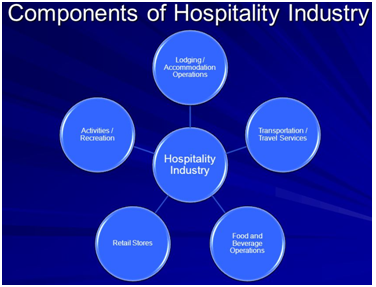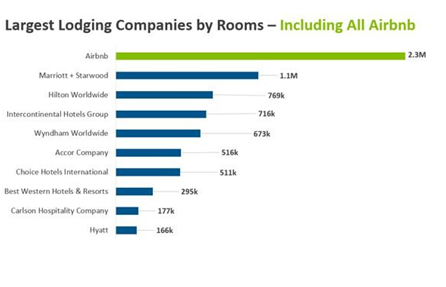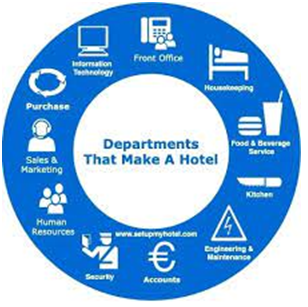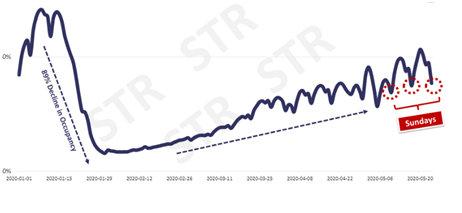Sustainable Management Assignment: Accommodation in Hot
Question
Task: To prepare this sustainable management assignment, students are required to demonstrate their capacity to critically think about the contemporary challenges within the accommodation sector and provide solutions using judgements, creativity/innovation, and logic to improve business performance. Make sure you discuss in-depth with examples. Add image wherever appropriate.
A. What are the components of Hotel Accommodation? Management both the front and back of house areas?
B. ONE key trend in Hotel Accommodation Management-AIRBNB/Technology/Franchising.
C. ONE key strategy to improve business performance-Revenue Management/Group Reservation Team etc.
D. Identify the different departments in the hotels and their relationship with the accommodation sector.
E. ONE key management issues and contemporary challenges in the global accommodation sector based on the recent COVID-19 pandemic.
F. Solutions or Recommendations for the management challenges identified.
Answer
Executive Summary
The current sustainable management assignment is focused on the hotel industry which is an important part of hospitality which was considered for the present report. The report has analyzed the different elements of the hotel industry to understand the operational process of this industry. Moreover, the report considered the recent trends in the present hotel industry. Digitalization was identified as the recent trend of the hotel industry. However, the hotel organizations seemed to face challenges in terms of the automation of the services. The report suggested adopting the implementation of AI and ML for the improvement of performance. Further research was taken to understand the impact of Covid19 on the supply chain and financial management. The research suggested the hotels adopt a sustainable management strategy to sustain themselves in the changing environment.
Introduction
The hotel industry and global traveling industry have faced a surge in growth in recent times within the past few years. Similarly, the tourism and travel industry both have a direct connection with the hotel industry as both of them have direct influence to ensure the growth of this selected industry. However, the hotel industry has continued the growth curve with a strong performance and resulted in the sustainable growth of 5% to 6% in the 2018 financial year before the hit of the global pandemic(deloitte.wsj.com. 2021). Considering the hospitality and tourism industry, travelers have considered hotels as the basic accommodation for the cheapest destination for tourism. Based on the size and service quality, hotels can be divided into different segments, from low budget to a higher budget. The aim of the present report is to understand the different factors influencing accommodation in the hotel industry. Moreover, the contemporary pandemic situation has created a challenge for the traveling and hotel industry with less customer engagement. Contextually, the present report has considered the challenges faced by the hotel industry due to the pandemic situation. However, the scope of the report is to understand the key trends and strategies for international hotel accommodation management to identify the different challenges faced by the industry during the pandemic. Further research work has been taken to suggest the strategic recommendation to the hotel industry to sustain in the challenging pandemic situation.
A. Components of Hotel Accommodation
Success in the hotel industry and accommodation have different contextual success factors. Griar and Bojnec (2019) have identified pricing as the most influential element for success in the hotel industry. Along with the pricing and the service quality of accommodation, different components for the success in the hospitality and hotel. Moreover, internal entrepreneurial orientation and training have been reflected as the element for the success of the hotel industry. Griar and Bojnec (2019) have further established the internal strength of an organization like management and leadership for the employee management have offered competitive advantages to the accommodation organization. Identified components of for the success of hotel accommodation industry listed below-

Figure 1 Components of Hotel Industry
(Source: Griar and Bojnec, 2019)
- Decision-making is an important element to succeed in the hotel industry and to ensure quality accommodation. Decision-makers for a hotel accommodation have the responsibility to specify the quality of service and degrees of luxury. Departmental heads and executive directors have a contribution to success by selecting effective decisions for success.
- The appearance of a hotel and the response to the customer have been considered under the responsibility of the front desk management of a hotel. No section of the hotel industry would be dispensable without the effectiveness of the front desk operation of the accommodation (Frawley, Goh & Law, 2019). Detail-oriented guests have a demand to know about the detailed information regarding the hotel and facilities offered to the guest, along with the timing for check-ins and check-outs. Managers with strong emotional intelligence and conflict resolution skills could deliver value to the hotel by helping guests with the required information. Additionally, the communication skill to communicate effectively with the guest have played a significant role in the front desk operation.
- Housekeeping has the responsibility to maintain the quality of the proposed service quality. Leung (2019) has mentioned contemporary accommodation processes have the significant application of the modern tech utilities. Television, computers, wifi, DVD, and game consoles have been kept as the essential utilities in the hotels. The expertise of the housekeeping staff has enormous importance in handling the tech troubles, the safety, and the security of the guests within the hotel.
- The accounting staff has taken the responsibility to track the records of the expenses and earnings from the operation. A strong accounting department has added extra value to the operation of the hotel industry (Brown et al., 2017).
B. One Key Trend in Hotel Accommodation Management
Mody & Hanks (2020) have commented on the consumption authenticity of the hotel industries focusing on the brand loyalty of the hotel industries. The short-term rental market has been observed to have a sharp growth curve in the last decade with the ascendance of Airbnb. Tragically, the enforcement of regulations in hotel booking and the availability of hotels on online platforms has caused a sharp decline in Airbnb (van Holm, 2020).

Figure 2 Airbnb Competition
(Source: van Holm, 2020)
Competition of Airbnb with traditional hotels has been overstated several times as it imposed a passive threat on the growth. The first stage of the growth of Airbnb has faced a strong attack from the hoteliers and has experienced a stage of denial (van Holm, 2020). However, the growth of the technology and online hotel booking facility has made the traditional organizations integrate their performance with Airbnb. The context of Airbnb has indicated different trends of the contemporary hotel industry, among which the most influencing trend is digitization in the hotel accommodation sector.
Xu, Stienmetz, and Ashton (2020) have mentioned the context of robotics for the leadership of the hotel and hospitality industry. The utilization of automation for smart hotel management has emerged as the global trend in the hotel industry, where the sustainable operation of the hotel industries could be ensured with better accounting management (Zheng & Forgacs, 2017). AI and ML have become more profound with extensive research in these fields. The response time to the query of the guest could be improved with the performance through AI and ML, where the accuracy in the providing service could be achieved. AI and ML have opened the scope to implement robotics in the service management process, as identified in the literature of Xu, Stienmetz, and Ashton (2020). Further innovative approach in the implementation of digital technology with the implementation of virtual and augmented reality in service management has gained extreme popularity in the hotel industry in the marketing management. Moreover, the hoteliers have shown profound interest in developing an interactive map of the hotel rooms and accommodation facilities to place at the entrance of the hotel (van Holm, 2020).
C. One Key strategy to Improve the Performance
As per Buhalis and Leung (2018), 'smart hospitality' could be implemented as the key strategies to sustain in the changing environment of trends in the hospitality industry. Revenue management strategy could be improved with the powerful brand management, implementation of suitable sales model, as well as the focus on the critical key performance identifiers. However, the solid technical infrastructure, as well as the alignment to stable marketing through compelling and relevant content, have strategically been implemented to improve the performance of the hotel industries. However, Alrawadieh, Alrawadieh, and Cetin (2021) have commented that digital transformation in promotion and advertising could be utilized for the improvement of revenue performance.

Figure 3 Revenue Strategies
(Source: Nair, 2019)
Nair (2019) has proposed that dynamic pricing and non-pricing strategies have significant influence over customer attraction. Hence, the content moderation and monetization following the regulations of the pricing and non-pricing strategy could deliver values to the hotel industries. Pricing and non-pricing strategies have removed the non-essential and unpredictable elements of the hotel to make a scope for the improved revenue generation process. Additionally, more customer engagement has added more value to the pricing strategy. Sahai et al. (2018) has considered that customized digital marketing has added value to revenue management. Specifically, social media optimization has been perceived as more effective for the cost-effectiveness of this promotional channel and better engagement options. Social media promotional channels have options to create content with interactive audiovisual mediums to promote the business. Moreover, the social media matrix has offered a scope to understand the effectiveness of a promotional campaign for decision-making in terms of the cost for marketing and revenue from the marketed campaigns. The effective customer journey has enabled a firm to understand the expected revenue from a specific marketing campaign. Damnjanovi, Lonari, and Dlai (2020) have mentioned, digital marketing has offered a better understanding of the market status and the customer journey in the hotel industry. The focus of digital marketing in the customer behavior and customer journey has offered a scope to redefine the service facilities for the hoteliers to expect better customer engagement to reflect in the revenue of the firm.
D. Identification of Different Departments in Hotel
Wang, Yang, and Yang (2019) have identified the internal branding of a hotel as reflected in the external performance of the hotel. Internal brands have been formed with the different departmental elements of a hotel. Starting from the front office to the back office desk, everything related to the service delivery and internal management of a hotel has been perceived as the departmental elements.

Figure 4 Different Departments of Hotels
(Source: Betts, 2020)
The front office desk has offered a scope to understand the demand of the guest to offer suitable accommodation and service within the hotel (Betts, 2020). Next, the housekeeping department has profound importance in ensuring the safe and comfortable staying of the guest in the hotel. The excellence of the housekeeping department has been elevated with the performance of the food beverage management team. The maintenance team of a hotel has been formed with the beverage and food department as well as the housekeeping department. Nieves and Diaz-Meneses (2018) have identified that the excellence of the managing team and the innovative thinking of the employees of the front office operations and housekeeping have offered scope to improve the brand value of the hotel. The kitchen department has additional importance for the better accommodation of the customer in the hotel. The Accounts department has ensured reliable accounting to the customer and offered a detailed understanding of the pricing options offered by the hotel to the guests (Betts, 2020). Moreover, the security team has importance for value addition to the security of the guest and their belongings within the hotels. Transformational and authentic leadership approaches have improved the performance of the departments of a hotel to offer reliable and comfortable accommodation to the guests. Authentic information delivery by the sales team to the guests has elevated the comfort of the customer in the selection of accommodation.
The operational approaches of the aforesaid department have improved the accommodation experience of the customers at the hotel, but the importance of the human resource department has been significant to maintain the transparent workflow in the organization (Wang, Yang & Yang, 2019).
E. Key management Issues and Contemporary issues regarding Covid-19
Continuous lockdown and increased contamination have posed a threat to the expansion of the hotel industries as well as on the operation of the hotels. Increased contamination has demanded the hotels be transformed into safe homes and hospitals for the patients. Moreover, the social distancing and lockdown have impacted customer engagement. Investors have withdrawn their hope from the hospitality industries for the increased rate of active Covid-19 patients (Japutra & Situmorang, 2021). However, above all these issues, the major issue of the Covid-19 pandemic on the hotel industry has been observed in the financial management process of the organizations as the operation of hotels in the new normals (after lockdown period).

Figure 5 Customer Engagement to the Hotels During the pandemic
(Source:Jiang & Wen, 2020)
Supply chain management of the hotels has been disrupted due to the pandemic, and suppliers have demanded the outstanding amount and the hotels need to maintain a regular sanitization process. Border closing and travel restrictions have created issues for the guest traveling to the hotels during the pandemic period (Jiang & Wen, 2020). Moreover, the bourbon areas have been deeply affected by the impact of Covid-19, where the government has asked for financial and physical help from the hotels to support humanity during the pandemic period.
Increased threats of financial management have been observed when the shares of the company have fallen below the extreme level (Jiang & Wen, 2020). After the pandemic period, the hoteliers have achieved a scope to revamp their financial strength, but the restriction of the occupancy of the hotels has created more issues to the financial management. Consequently, the operation of hotels with 35% (in some cases with 50%) has created an issue to financial management, as the operational cost has increased compared to the revenue of the firms. Moreover, the cost of regular sanitizing and maintenance of the Covid-19 testing system have added extra operational cost (Jiang & Wen, 2020). Moreover, the extra concern for the health and hygiene of the guest created extra pressure for the management team to employ extra staff. Consequently, the additional cost for the management of extra-human resources in the organization has created financial pressure on the management team.
F. Recommendation for the Solution of the Challenges identified
The World Health Organization (WHO) has proposed to the hotels to work with the society to follow the duties of social responsibility of the hotels. Working with the local group of workers and local customers would be beneficial for the hotels to improve their performance in the post-pandemic period to tackle the monetary and financial issues faced during the pandemic period (Apps.who.int, 2021). Analysis of the identified issues has mentioned that the supply chain of the hotel industry has been disrupted during the Covid-19 period. Hence the organizational focus to build a local supply chain could improve the performance of the hotels in managing the issues related to the Covid-19 pandemic. Other recommendations for the improvement of the financial performance has been listed below-
- According to Rodríguez-Antón and Alonso-Almeida (2020) has identified that performance evaluation has offered scope for the hotels to reduce the industry overhead and the no-essential departments for the operation. The cost-cutting in the performance has been reflected in the higher profit margin of the hotels. Identification of the origins and the issues related to the present performance has declared the ways of improvement of future performance. Hence, the evaluation of present operational and departmental performance has offered scope to specify future strategies.
- Focus on green sustainability has created a differentiation from the competitors, and market sensation would be created with this approach of performance management. Sigala (2020) has mentioned that green sustainability has improved the brand value of the hotel to attract more customers to tackle the financial hardships. A premium customer base would be created with the green sustainability approach. Moreover, the pricing of the accommodation can also be leveraged after the green sustainability implementation.
- Major focus on globalization through an effective marketing plan could improve the performance as well build a strong market presence for the hotels. A long-term response to the pandemic could be recovered with the global branding strategy to attract international customers to mitigate the financial challenges (Le & Phi, 2021).
Conclusion
Insightful analysis of the hotel industry has identified that the performance of a hotel has been relied upon by the combination of different departments. Additionally, departmental excellence has been reflected in the improved performance of an organization. However, the present industry scenario has faced the threat of digitization, and it has also offered scope for improvement. Focus on automation and AI, ML has created value for the organization to enhance the accuracy in the performance of the organizations. Content marketing through social media channels has been taken as an important aspect to deal with the changing environment for the hotel industry. Accidentally, the Covid-19 has impacted the performance of the hotel organizations as they have faced supply chain management and financial issues in terms of operational management. Further research on organizational performance has shown that a sustainability approach could be an option to tackle the issues of the Covid-19. Moreover, the focus on globalization would be a value addition for the organizations to sustain in a challenging environment in the post-pandemic period.
References
Alrawadieh, Z., Alrawadieh, Z., & Cetin, G. (2021). Digital transformation and revenue management: Evidence from the hotel industry. Tourism Economics, 27(2), 328-345. https://journals.sagepub.com/doi/abs/10.1177/1354816620901928
Apps.who.int. (2021). Retrieved 18 June 2021, from https://apps.who.int/iris/rest/bitstreams/1297222/retrieve.
Betts, B. S. H. (2020). The Importance of Human Resource Management in the Hotel industry in Sierra Leone. American Scientific Research Journal for Engineering, Technology, and Sciences (ASRJETS), 64(1), 96-108.https://asrjetsjournal.org/index.php/American_Scientific_Journal/article/view/5537
Brown, N. A., Rovins, J. E., Feldmann-Jensen, S., Orchiston, C., & Johnston, D. (2017). Exploring disaster resilience within the hotel sector: A systematic review of literature. International Journal of Disaster Risk Reduction, 22, 362-370.https://www.sciencedirect.com/science/article/pii/S2212420916307841
Buhalis, D., & Leung, R. (2018). Smart hospitality—Interconnectivity and interoperability towards an ecosystem. International Journal of Hospitality Management, 71, 41-50.http://eprints.bournemouth.ac.uk/30148/1/SmartHospitalityIJHM_Paper_R1%20%281%29.pdf Damnjanovi, V., Lonari, D., & Dlai, J. (2020). TEACHING CASE STUDY: Digital marketing strategy of Accor Hotels: shaping the future of hospitality. Tourism and hospitality management, 26(1), 233-244.https://hrcak.srce.hr/file/346425
deloitte.wsj.com. (2021). Retrieved 18 June 2021, from https://deloitte.wsj.com/cmo/2018/02/21/2018-travel-and-hospitality-industry-outlook/. Frawley, T., Goh, E., & Law, R. (2019). Quality assurance at hotel management tertiary institutions in Australia: An insight into factors behind domestic and international student satisfaction. Journal of Hospitality & Tourism Education, 31(1), 1-9.https://www.tandfonline.com/doi/abs/10.1080/10963758.2018.1480961
González-Torres, T., Rodríguez-Sánchez, J. L., & Pelechano-Barahona, E. (2021). Managing relationships in the Tourism Supply Chain to overcome epidemic outbreaks: The case of COVID-19 and the hospitality industry in Spain. International journal of hospitality management, 92, 102733.https://www.sciencedirect.com/science/article/pii/S0278431920302851
Griar, S., & Bojnec, Š. (2019). Prices of short-stay accommodation: time series of a eurozone country. International Journal of Contemporary Hospitality Management. https://www.emerald.com/insight/content/doi/10.1108/IJCHM-01-2019-0091/full/html
Japutra, A., & Situmorang, R. (2021). The repercussions and challenges of COVID-19 in the hotel industry: Potential strategies from a case study of Indonesia. International Journal of Hospitality Management, 95, 102890.https://www.sciencedirect.com/science/article/pii/S0278431921000335
Jiang, Y., & Wen, J. (2020). Effects of COVID-19 on hotel marketing and management: a perspective article. International Journal of Contemporary Hospitality Management.https://core.ac.uk/download/pdf/327949008.pdf
Le, D., & Phi, G. (2021). Strategic responses of the hotel sector to COVID-19: Toward a refined pandemic crisis management framework. International Journal of Hospitality Management, 94, 102808.https://e-tarjome.com/storage/panel/fileuploads/2021-05-27/1622092641_E15424.pdf
Leung, R. (2019). Smart hospitality: Taiwan hotel stakeholder perspectives. Tourism Review. https://www.emerald.com/insight/content/doi/10.1108/TR-09-2017-0149/full/html Mody, M., & Hanks, L. (2020). Consumption authenticity in the accommodations industry: the keys to brand love and brand loyalty for hotels and Airbnb. Journal of Travel Research, 59(1), 173-189https://journals.sagepub.com/doi/pdf/10.1177/0047287519826233 Nair, G. K. (2019). Dynamics of pricing and non-pricing strategies, revenue management performance and competitive advantage in hotel industry. International journal of hospitality management, 82, 287-297.https://www.sciencedirect.com/science/article/pii/S0278431918305504
Nieves, J., & Diaz-Meneses, G. (2018). Knowledge sources and innovation in the hotel industry: Empirical analysis on Gran Canaria Island, a mature mass-tourism destination. International Journal of Contemporary Hospitality Management.https://www.emerald.com/insight/content/doi/10.1108/IJCHM-07-2016-0341/full/html Rodríguez-Antón, J. M., & Alonso-Almeida, M. D. M. (2020). COVID-19 Impacts and Recovery Strategies: The Case of the Hospitality Industry in Spain. Sustainability, 12(20), 8599.https://www.mdpi.com/2071-1050/12/20/8599/pdf
Sahai, S., Goel, R., Malik, P., Krishnan, C., Singh, G., & Bajpai, C. (2018). Role of social media optimization in digital marketing with special reference to trupay. International Journal of Engineering & Technology, 7(2.11), 52-57.https://www.researchgate.net/profile/Richa_Goel14/publication/324527022_Role_of_Social_Media_ Optimization_in_Digital_Marketing_with_special_reference_to_Trupay/links/5c9b1f7292851cf0ae9a 0663/Role-of-Social-Media-Optimization-in-Digital-Marketing-with-special-reference-to-Trupay.pdf
Sigala, M. (2020). Tourism and COVID-19: Impacts and implications for advancing and resetting industry and research. Journal of business research, 117, 312-321.https://www.ncbi.nlm.nih.gov/pmc/articles/PMC7290228/ van Holm, E. J. (2020). Evaluating the impact of short-term rental regulations on Airbnb in New Orleans. Cities, 104, 102803.https://www.sciencedirect.com/science/article/pii/S0264275119318220
Wang, Y. C., Yang, J., & Yang, C. E. (2019). Hotel internal branding: A participatory action study with a case hotel. Journal of Hospitality and Tourism Management, 40, 31-39. https://www.sciencedirect.com/science/article/pii/S1447677018304303 Xu, S., Stienmetz, J., & Ashton, M. (2020). How will service robots redefine leadership in hotel management? A Delphi approach. International Journal of Contemporary Hospitality
Management.https://www.emerald.com/insight/content/doi/10.1108/IJCHM-05-2019-0505/full/html Zheng, C., & Forgacs, G. (2017). The emerging trend of hotel total revenue management. Journal of Revenue and Pricing Management, 16(3), 238-245.https://link.springer.com/article/10.1057/s41272-016-0057-x












